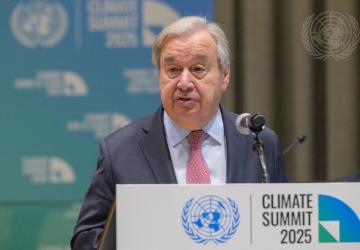
Kathmandu: Addressing the opening of the high-level special event on climate action in New York, the United Nations Secretary-General António Guterres said that science and economics both compel urgent climate action on September 24.
The UN Secretary-General Guterres mentioned that it still remains possible to limit global temperature rise to 1.5°C by the end of the century, warning of the consequences of permanently breaching that limit.
“As we have just heard, it is still possible to limit global temperature rise to 1.5°C by century’s end. We know what permanently breaching that limit would mean for people and the planet. The science compels climate action. So does the economics,” said Secretary-General António Guterres.
Secretary-General Guterres noted that clean energy is already powering jobs, driving growth, and facilitating sustainable development, while providing energy security and affordable access. Despite fossil fuel subsidies, investment in clean energy last year was double that of fossil fuels. “The bottom line: clean is competitive, and climate action is imperative,” he stated.
He highlighted progress under the Paris Agreement, noting that the projected global temperature rise has decreased from 4°C to under 3°C over the last decade if current pledges are fully implemented. However, he called for new plans for 2035, covering all sectors and delivering deep emissions cuts aligned with 1.5°C.
“Now, we need new plans for 2035 that go much further, and much faster: Delivering dramatic emissions cuts aligned with 1.5°C; covering all emissions and sectors; and accelerating a just energy transition globally,” stressed Guterres.
Additionally, the Secretary-General also cited examples of accelerated progress, noting China met its 2030 wind and solar target six years early, while India reached 50 per cent electricity capacity from non-fossil fuels five years ahead of schedule. He urged seizing the moment of a “new energy era” and said COP30 in Brazil must conclude with a credible global response plan.
The Secretary-General further highlighted five key areas for climate action: energy transition, methane reduction, forest protection, decarbonising heavy industry, and climate justice. Thus, he called for a shift from fossil fuels to clean energy, cutting methane emissions quickly, stopping deforestation, deploying green technologies in industry and transport, and ensuring support for vulnerable countries facing the worst climate impacts.
Calling for urgent financing solutions, Guterres noted reforms are needed in the international financial architecture to strengthen developing country participation. He pressed for effective debt relief, expanded multilateral bank lending, increased contributions to the Loss and Damage Fund, and a major boost in adaptation finance.
He emphasised that COP30 must chart a credible path to mobilise $1.3 trillion annually in climate finance by 2035, as agreed at COP29 in Baku, with clear sources, instruments, and accountability measures.
“The science demands action. The law commands it. The economics compel it. And people are calling for it. I look forward to hearing how you will respond – and the UN stands ready to help you to deliver,” Guterres declared, affirming that the UN stands ready to support countries in delivering their commitments.